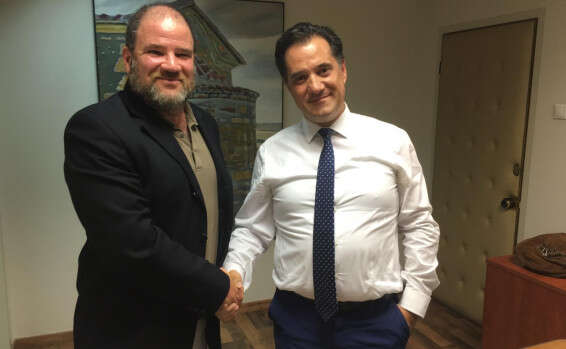On the day Greece's new conservative government was sworn in a week ago, new Minister of Development and Investment, Adonis Georgiadis, met with Israeli Ambassador to Athens, Irit Ben-Abba, for more than two hours. The two pitched practical ideas to develop economic ties between the two countries.
Georgiadis, vice president of the ruling New Democracy party, is not only one of the most popular politicians in Greece, he is also a bulldozer. As former health minister, he provided medicine to over 2 million uninsured people despite the deep economic crisis in his country, and without increasing his ministry's budget.
Follow Israel Hayom on Facebook and Twitter
Now he is focused on a priority for new Prime Minister Kyriakos Mitsotakis – foreign investment in Greece, and he sees Israel playing a large role in the development of the Greek economy.
"The ties between the two countries are today better than ever before," Georgiadis tells Israel Hayom.
"The strengthening of ties began in 2010 when the then-prime minister Papandreou met with [Prime Minister] Netanyahu. The next Greek government headed by Samaras founded the triangle between Greece, Israel and Egypt."
"Even during Prime Minister Tsipras' term, relations continued to strengthen between the two countries. The father of the current Greek prime minister [Mitsotakis] was the one who established diplomatic ties with Israel, and he wants to strengthen this relationship," Georgiadis says.
"We truly believe in the importance of this relationship, and the good thing is that most of the Greek population today believes that Israel is the only true ally of Greece in the region, because we have common threats and we share common values," he says
"Israel is the only western democracy in the Middle East, so it is the only country with which we can speak in a common language. The future of the relations between the two countries is looking bright," Georgiadis adds.
Q: Where would you like to see Israeli investment?
"First of all, in the field of technology. Israel is probably the leading country in the field of technological innovation, and we are interested in developing greater cooperation between the University of Thessaloniki and the Technion-Israel Institute of Technology. In tourism, as well."
Georgiadis says many Israeli investors are buying Greek hotels, real estate and land.
"Why not invest in the [tourism] industry, too?" Georgiadis asks. "Greece can be a good opportunity for Israeli investors because … salaries are very competitive. People here are highly educated and we are members of the European Union, which means that it's easy to export from here to the rest of the EU."
"Beyond that," says Georgiadis, "we are very close [geographically] to Israel, so we have advantages that can be very interesting for investors."
Q: And what would you say to Israelis who are afraid to invest because of the economic crisis?
"I understand their concerns. That is why the current government was elected, we will have a stable government in the next four years and a prime minister who is very supportive of business development and wants to open the market and liberalize it. Because of the crisis, the cost of property is still low, so if you want to invest, now is the right time."
"Expectations for Greece's economic development in the coming months are very high, we issued 10-year bonds at an interest rate of 1.9% which is the lowest in our history, meaning people really believe in this new government," says Georgiadis.
"We met with international economic institutions and presented them with [our] planned legislation to strengthen the business environment in Greece, which will be voted on by the end of August. They were very pleased. Our first priority is to make Greece a truly business-friendly country and accelerate privatization."
"More investors are coming," Georgiadis explains. "Investors have heard that there is a shift happening. By Sept. 1, we will publish a tender for army vehicle manufacturing companies. So far, two Israeli companies have expressed interest."
The election of the new conservative government in Greece was accompanied by renewed tensions with Turkey after Ankara began drilling for gas in the waters of northern Cyprus. The European Union imposed sanctions.
Does Georgiadis consider this conflict a potential danger to the entire region? "I would have preferred a stable and western Turkey," he says, "but [Turkish President Recep Tayyip] Erdogan decided to accept the S-400 missile systems from Russia, and that is a threat not only to Greece, but to the entire region."
"[US] President Trump decided to block the supply of F-35 to Turkey, as a consequence, so there is tension between Greece, Turkey, Cyprus, Israel and the US now. I do not think the Turks will risk a big confrontation with everyone. We are monitoring the situation, but without fear or panic."
Q: The impression is that every time Erdogan has domestic problems, like now, he creates international tension. For example, with the issue of illegal immigrants.
"There is great concern in Greece that one of [Turkey's] ways of reacting to the sanctions imposed by the European Union because of the drilling in the waters of Cyprus, or because of its current bad relations with the United States, will be to renew the influx of illegal refugees.
"This is a concern. But under the Samaras government, although Erdogan opened the borders of Turkey, we controlled our border. The problem arose in 2015 when Tsipras decided that he wanted open borders. We are not planning an open-border policy. We know how to defend our country."
Q: The EU has decided to mark products coming from Israel as "occupied territories." There is no such labeling for the territories Turkey occupies in northern Cyprus. Do you accept this?
"No. We do not recognize Northern Cyprus as a country. There is an illegal occupation there. And the EU should be tougher in the face of this illegal occupation of a European country. It is a scandal that this situation continues to this day. I share Israel's concerns about what is going on. You have a friend who will help you."
Q: Will your government make the brave decision to relocate the Greek embassy in Israel to Jerusalem?
"I am not the minister of foreign affairs and I cannot take an official position on the matter. I can only say, as a historian, that I learned in history books that Jerusalem has always been a Jewish city."
Georgiadis intends to visit Israel with his colleague, Minister of Agriculture Makis Voridis, who has been accused of anti-Semitism. Both of them – very popular politicians – are former members of the nationalist right-wing Laos party. Georgiadis has also been criticized for publicly promoting a book by Konstantinos Plevris, one of the most anti-Semitic writers in modern Greece. Georgiadis has expressed regret for his actions publicly and since then he has been considered a great friend by the local Jewish community and Israel.
"A decade ago, when I was appointed to the post in the Development and Shipping Ministry, Israel had concerns about me, but the president of the [Greek] Jewish community knew me and defended me."
"I want to help fight anti-Semitism, which is a big problem in Greece, and the Golden Dawn Party, which sat in the Parliament, was proof of this problem. Golden Dawn being out of Parliament is a big step forward for our democracy. It shows the willingness of the people to fight anti-Semitism."
"The minister of agriculture, who is currently causing concern, is a great friend of Israel. Many people have made mistakes in their past, and I have made mistakes myself, but we want strong relations with Israel and believe in them. Anti-Semitism is a disgrace. That is why I made a public apology for my mistakes. I asked for forgiveness from the people that my actions have hurt. It came from my heart. "
Q: You have studied history and you still do. How do you explain the existence of anti-Semitism in Greece?
"We have always been on the same side. Anti-Semitism is a relic from the past. People wanted to blame others for their failures and their bad deeds. In Greece, although there is quite a bit of anti-Semitism [in terms of stereotypes, etc.], it is not the violent type."
"During World War II, many Greeks saved Jews and today there is a significant change. One reason being that all the politicians publicly declare that Israel is our best friend, so there is no more room for anti-Semitism in Greece. Honestly, Tsipras helped a lot on this issue. Modern anti-Semitism stems from the Palestinian issue [conflict], and you can see many leftist extremists in Greece who accuse Israel of being a Nazi Fourth Reich against the Palestinians."
"The fact that we had a leftist government [Tsipras] that said it believed in strong ties with Israel was very helpful, because many people understood that they were wrong."




